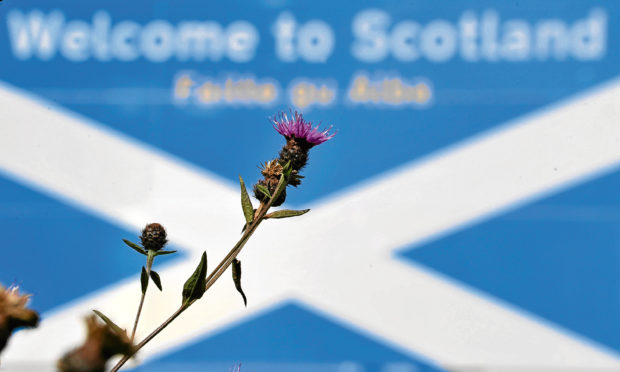Add together economic difficulties and nationalist ideologies and the conversation inevitably turns to borders.
So the latest squabble between Westminster and Holyrood was entirely predictable.
History tells us it’ll end ugly. You might have thought coronavirus would highlight the artificiality of borders. The virus has no care for whether it infects English or Scots.
Those that point to the underlying statistics behind the bald death toll – such as the higher prevalence of black people among the dead – as evidence that Covid discriminates are wrong. Society discriminates.
High-profile outbreaks in Leicester and on a Herefordshire farm just this week have been down to bad capitalists and inadequate housing, not a racist bug.
And yet there’s talk of Nicola Sturgeon closing the border to keep coronavirus out. It’s all very well saying it’s a public health measure, but there’s a fairly icky history of nationalists picking on another people in the name of the nation’s wellbeing.
Most in the SNP were quick to condemn the absolute roasters who headed down the A1 recently to set up stall under the “Welcome to Scotland” sign and shout at passing cars that in fact the English were anything but.
The first minister has been managing the more excitable wing of her party long enough that she ought to have foreseen the consequences of her apparent prevarication on the border issue.
Into this already-tense landscape the Tories have lobbed Brexit, guaranteed to make any political scenario approximately 30 times worse.
The Nats have not taken kindly to a slow-burn story that Westminster will pull rank post-Brexit and lay claim to new powers.
It’s not really a power grab because Westminster is not taking powers from Edinburgh.
They are taking them from Brussels. And not passing them on to Holyrood.
The current flashpoint is state aid – an apparently technical and dull issue that’s turned into a monster.
A bit like if John Swinney were a werewolf. State aid is a handy economic lever to be able to dole out support to favoured industries.
It can be used to shape the economy and, handily, pick up votes if wielded in wavering constituencies.
And the Tories intend to use it as a tool to create a common market within the UK, to rub out borders for some purposes.
Essentially what the Brexiteers objected to about being in the EU they are going to inflict on Scotland, Wales and Northern Ireland.
Except the people who claim to be wacky geniuses in Downing Street don’t expect the inhabitants of Britain’s constituent nations to feel about Westminster as they did about Brussels.
It’s as pernicious as it is stupid. A crackpot ideology fuelled by English exceptionalism – nationalism by any other name.
On the other side of the stooshie are a party who are nationalists by name, the SNP.
They want to get back in the EU, to swap out a British common trade area for a European one.
They want to break down borders except for the one with England that defines who they are, where they stand in elections.
But look at any electoral map of the UK and it’s impossible to discern the border as a geographer would understand it.
The map is blue from Hexham to Dunbar. The SNP declared following their December general election success that Scotland had rejected the Tories.
Which begs the question: “What is Scotland?”
If you live in Melrose and voted Tory, are you not Scottish? And what of the north-east?
It’s a more mixed picture than in the borderlands, but it certainly did not unanimously reject the Conservatives.
In fact, some of the very seats that sustained the SNP while Labour ruled the roost in Scotland have now turned to the Tories.
It’s almost as if when Sturgeon and the SNP talk of Scotland they are really thinking of the central belt. And that’s a dangerous route to go down.
The central belt is an area without a defined border or definition (witness recent social media discussion about whether Fife qualifies or not.
Speaking as someone related to a few Fifers, I’d define it as a separate branch of evolution.
But it alone is not Scotland. The SNP need look no further than the state of Scottish Labour for an example of a party that failed to grasp the difference between Scotland and its central belt; one that treated areas like the borderlands and the north-east as the margins.
Whether it’s drawing a line to define Scotland’s central belt against the rest of the nation, or dividing Scotland from England, or putting a hard border around the UK to bind those within it closer together, there are certain qualities that ought to be at the forefront – care, pragmatism, humanity and empathy.
The administrations in Holyrood and Westminster will find plenty more to square up over in the months to come as coping with the ongoing health emergency plays out along with Brexit and a failing economy.
They’ll focus on their differences. Yet both are driven by a desire to put up borders, and in doing so, neither inspires confidence they comprehend the forces they are already unleashing.
James Millar is a political commentator and author and a former Westminster correspondent for The Sunday Post

